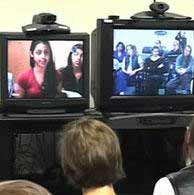This is the VOA Special English Education Report.
An American nonprofit organization helps young people around the world to understand important issues, and each other.
The Global Nomads Group organizes educational videoconferences. Students and speakers discuss subjects like AIDS, world religions, nuclear weapons, immigration, climate change and politics.

For example, students from at least eight schools in Ghana talked with American students about the election and inauguration of President Obama. The Ghanaians took part from a distance learning center in Accra. Live coverage from Washington "brought the energy from the streets to the classrooms," said a story in Modern Ghana News.
The Global Nomads Group, or G.N.G., was started in 1998 by four university students. They wanted other young people to become more informed about the world.
Programs have been held in more than 40 countries. The group says at least 10,000 students take part each year.
Shirley Herrin teaches high school in Magnolia, Texas. She says her school is not using the programs this year because of budget cuts. But she tells us in an e-mail: "A live conference feed was 100% better than a textbook. Magnolia is a small town and for many of my students this was an opportunity to travel around the world."
One thing her students discovered is that they liked the same music and activities as many other young people around the world.
The Global Nomads Group charges for programs, but says it tries to help schools with limited resources.
In one program, students in Rwanda and at several American high schools asked each other questions. These included questions from Rwandan students about subjects like drug use, H.I.V./AIDS and girls in school who get pregnant.
An American boy asked about ethnic groups in Rwanda.
BOY: "The Tutsi and the Hutu, I am just wondering what you guys see as the differences between those two tribes?" GIRL: "This is Alene speaking. There is actually no difference between the Hutus and the Tutsis. First of all they are not two different tribes. We are one people. They are just ethnicities..."
At the end of the videoconference, the Rwandan teacher made an announcement.
TEACHER: "In our culture we never say goodbye, and we are going to entertain you. Thank you."
(MUSIC)
And that's the VOA Special English Education Report, written by Karen Leggett. I'm Steve Ember.
Related stories:
High school exchange students in US share their thoughts
College guide aims to help students avoid a 'thin education'
US States will compete for school reform aid
US students bring honey project to Ghana
(Source: VOA 英語(yǔ)點(diǎn)津編輯)